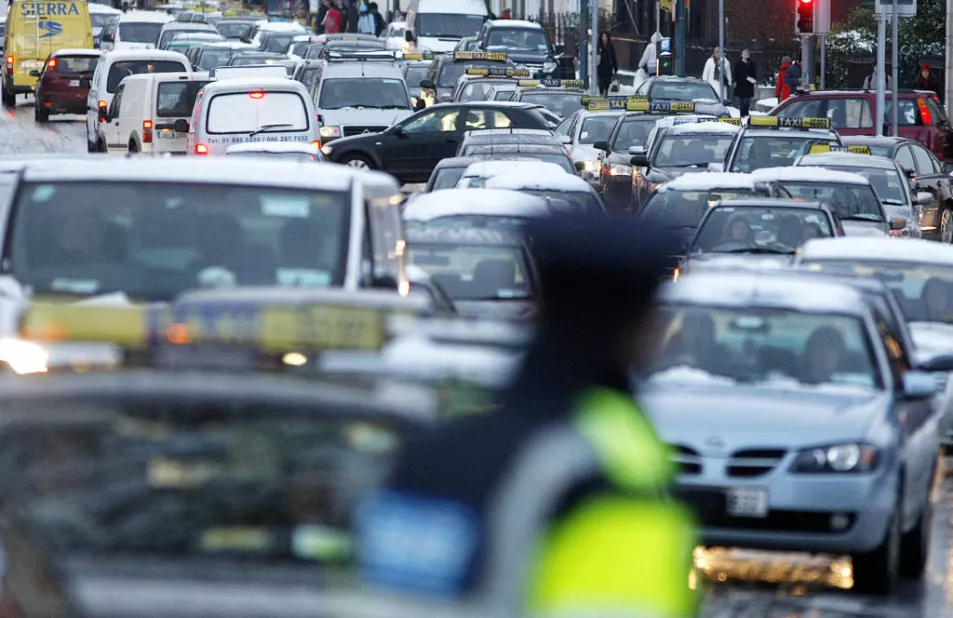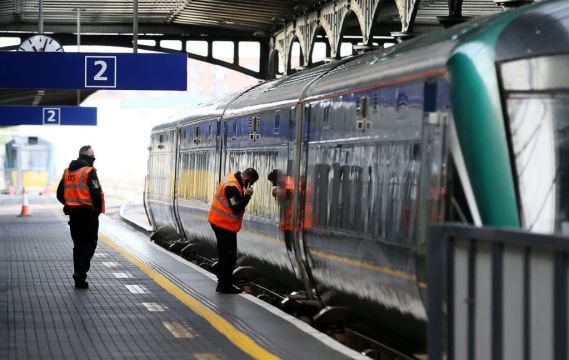The introduction of free public transport has been backed by an Oireachtas committee report on Ireland’s transport sector.
The Joint Committee on Environment and Climate Action’s report, published this month, points the way towards reducing emissions in the sector by 51 per cent by 2030 and to net zero emissions by 2050.
Free public transport, road user charges and car capacity limits in cities are among the measures recommended to reduce emissions — here is how.
Why do we need to reduce transport emissions?
Ireland currently has the fourth highest level of transport emissions per capita in Europe, according to the report.
The transport sector is responsible for around 20 per cent of Ireland’s overall carbon emissions, with private cars being the largest contributors.
It is furthermore estimated that population and employment growth in the Greater Dublin Area alone could result in a 28.5 per cent increase in the number of journeys by 2035 — meaning a further surge in emissions unless action is taken.
How will making public transport free help?
The Committee behind the report believes that free public transport could encourage the population to shift towards a more sustainable mode of travel — and away from the car.
It recommends that a free public transport system be costed as an option for encouraging its uptake in Ireland.
This would be completed in line with transport improvements, such as electrifying all public transport to reduce its carbon emissions.
The Committee recommends that the Government consider the “benefits and feasibility” of providing free public transport, based on the experiences of similar policies in cities and towns in Europe and beyond, and roll out initiatives in this respect “as soon as possible”.
What if I don't have access to public transport?
This is a major hurdle. The report acknowledges that decades of poor planning has resulted in communities spread out around Ireland, with little access to public transport.
The “heavy development of motorway and road networks has imposed car dependency on a significant proportion of the population, with no sustainable alternatives,” it adds.
To combat this, it recommends a “significant increase” in investment in an immediate expansion of public transport measures for rural and dispersed communities in Ireland, “to provide a level of service throughout the day that can provide a realistic alternative to travelling by car”.

It has warned that initiatives to improve public transport must be based on “supply first,” rather than “solely demand-dependent initiatives”, in order to achieve the necessary reductions in carbon emissions.
So rail and bus networks could be expanded with more frequent services even if demand isn't necessarily there — with free access for the public acting as one “pull factor” towards the more sustainable transport.
What else might be done to discourage private car use?
Road user charges, capacity restrictions and an overhaul of road construction are all recommended in the report to further discourage Ireland's dependency on private cars.
The Committee recommends a review of all future road construction projects, to analyse if “such substantial investment” would be better allocated to other projects such as sustainable transport and remote-working hubs.
It has praised the Government’s remote working strategy and recommends further exploration be given to the establishment of remote working hubs in towns and villages — reducing the need for many workers to commute long distances each day.

The Committee recommends that sustainable transport links to these hubs, particularly in less densely populated areas, be considered and that a national target for remote working be introduced.
The need for car ownership could also be reduced with a fleet of “sharing” vehicles such as cars, e-scooters and e-bikes, according to the Committee.
It recommends that road user charges — including potential targets for car mileage reductions — be examined and that capacity for private cars be reduced in cities, towns and villages.
What if there’s just no option for me besides a car?
Your car could still be involved in the shift towards lower-impact forms of travel.
The Committee recommends the electrification of Ireland’s public transport and freight fleet — along with private vehicles.
It believes there should be a focus on transitioning to fully electric, zero-emission electric vehicles (EV), in light of evidence surrounding the emissions impact of “low-emission” or “hybrid” ones.
Efforts should be made to fully and quickly equalise the purchase cost of new zero-emission EVs with fossil fuel vehicles, the report recommends, while incentives and supports for EV take-up should be reviewed and targeted with a focus on areas of high forced car usage.
The Committee also recommends speeding up the rollout of Ireland’s electric charging infrastructure to encourage EV uptake.
What if I prefer to walk or cycle?
The report also makes a series of recommendations to encourage a shift towards walking and cycling, saying “safety and comfort” will be key factors in achieving this.
It calls on the Government to quickly deliver funding for cycling and pedestrian infrastructure, recommending the introduction of “cycling superhighways” outside larger cities and family-friendly cycling infrastructure to achieve wider and more diverse uptake.
It also recommends that incentives for the uptake of e-bikes and bicycles be reviewed beyond the current bike-to-work scheme, and that a major upgrade of bike-parking infrastructure take place.
Other actions could also be taken to support greater integration between active travel modes and public transport — such as ensuring easy pedestrian and cycle access to bus and railway stations and an increased capacity onboard for the carrying of bikes.
How could all of this impact the economy?
The Committee believes a shift towards more sustainable modes of transport has the potential to create “new economic and procurement opportunities”.
It recommends that a just transition approach be taken to ensure that these opportunities are open to SMEs or social enterprises, with a local focus.
The expansion of public transport fleets and infrastructure will also require new recruitment and staffing, which could boost employment.
These are all recommendations — what has the Government actually committed to?
Ireland’s Climate Action Plan published in 2019 outlines a roadmap to becoming a climate neutral economy by 2050. It sets out 183 actions to tackle the climate crisis across all sectors — 28 of which target the transport sector.
The main actions set out for transport include increasing the number of electric vehicles on the road to around one million by 2030, expanding the country’s network of cycle paths and “park and ride” facilities, and no longer purchasing diesel-only public buses in cities.
The Climate Action and Low Carbon Development (Amendment) Bill 2021, which was published in March 2021, is set to make the Government legally accountable for the target of reaching net zero emissions by 2050.
This report from the Oireachtas committee sets out how the target could be achieved with one of many sector-by-sector analyses.







